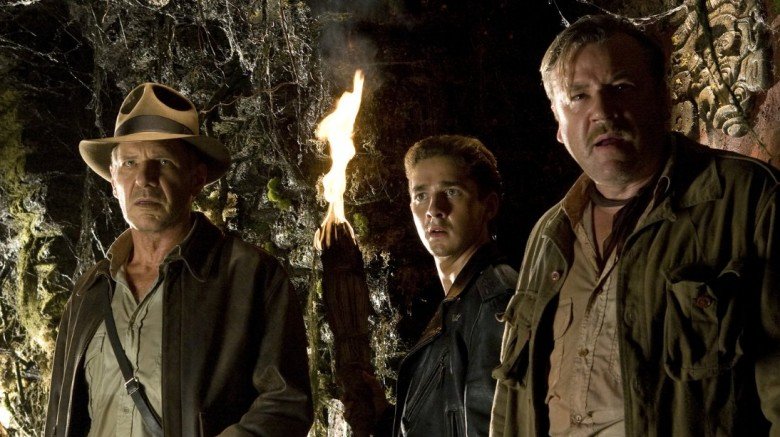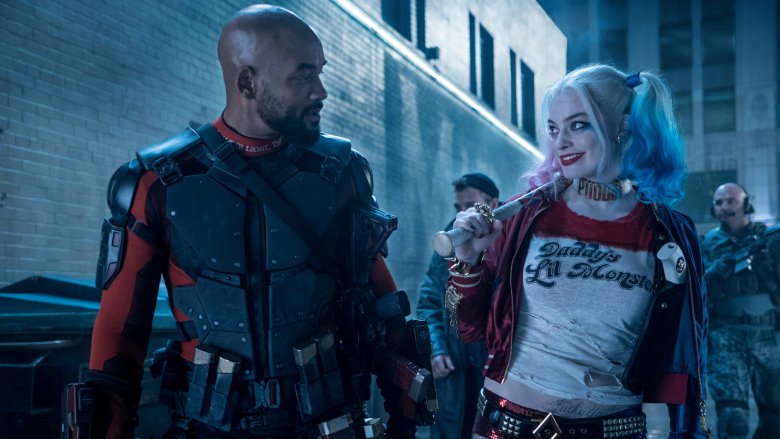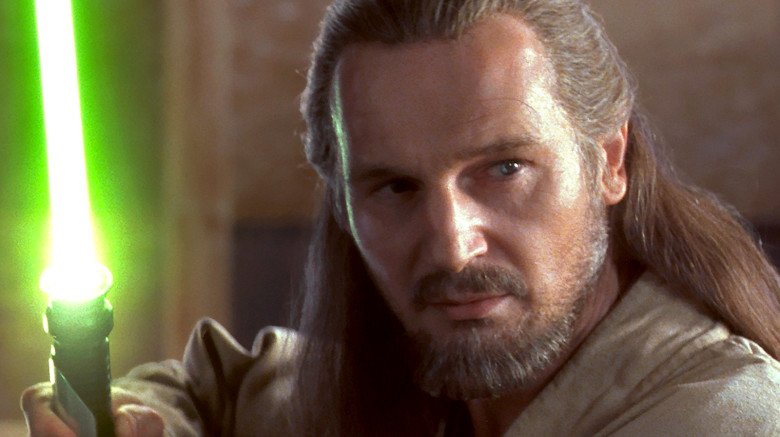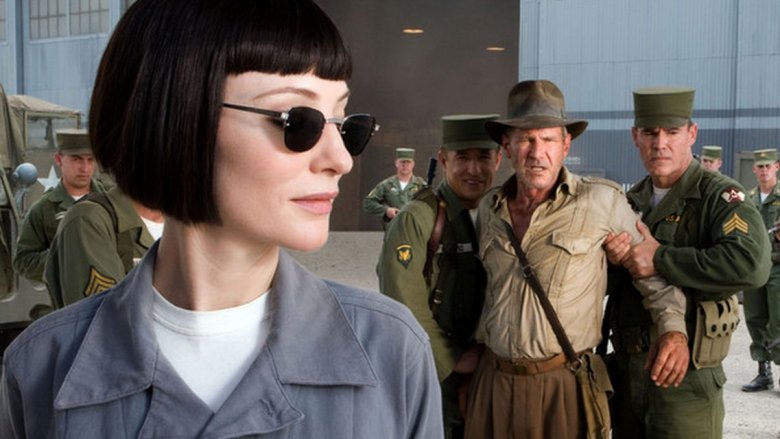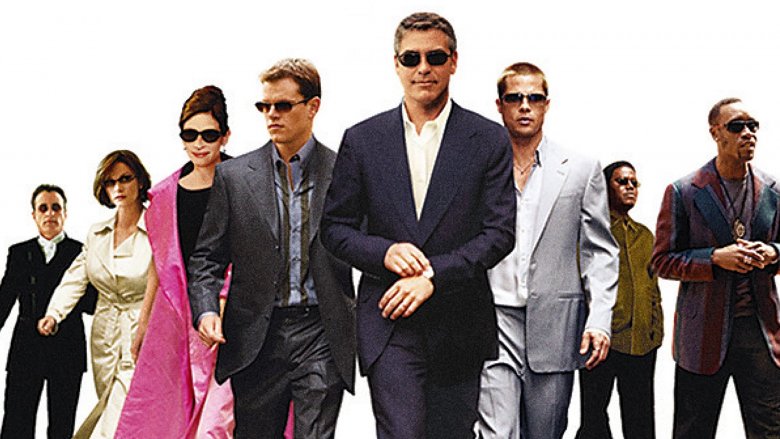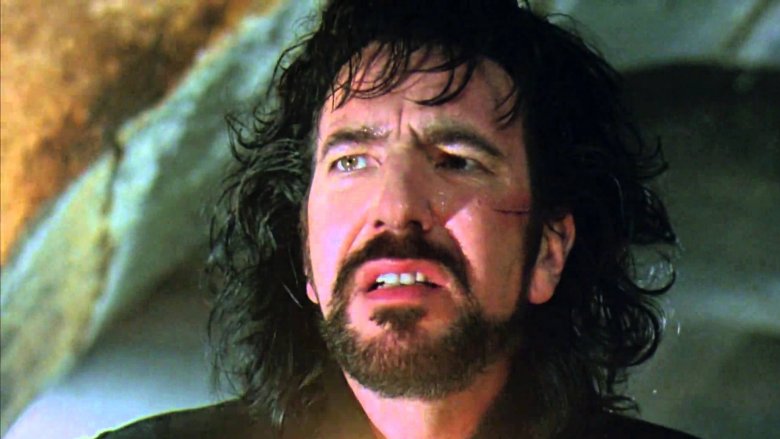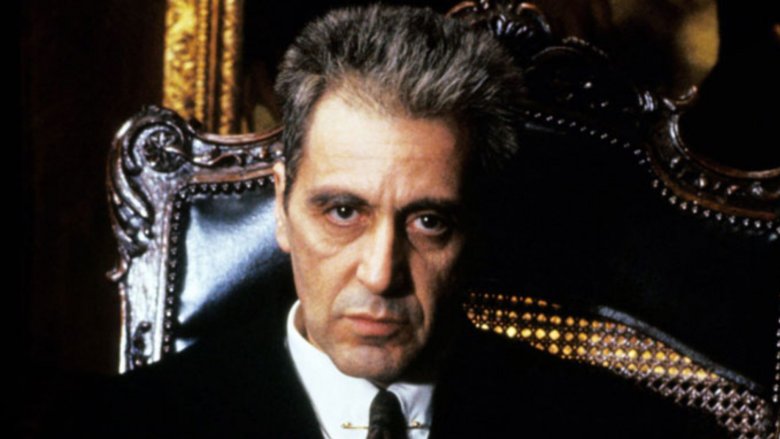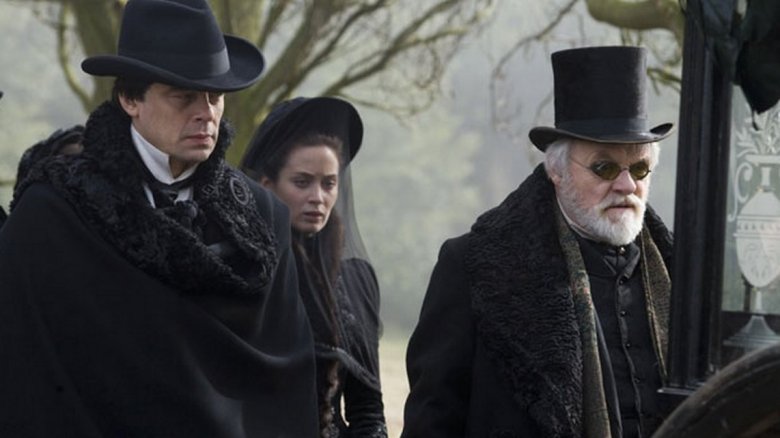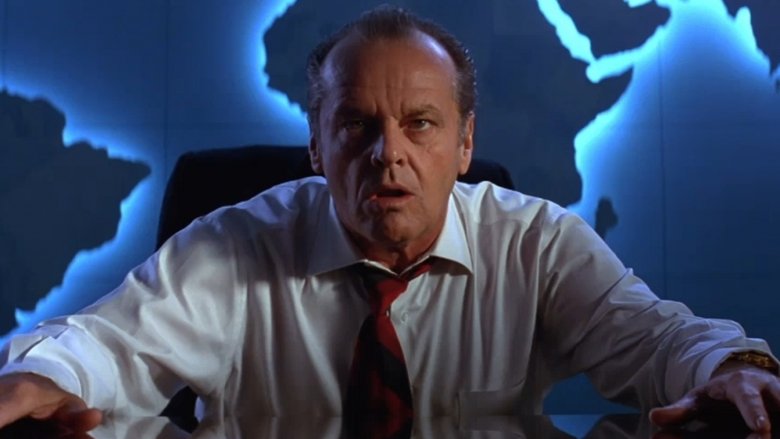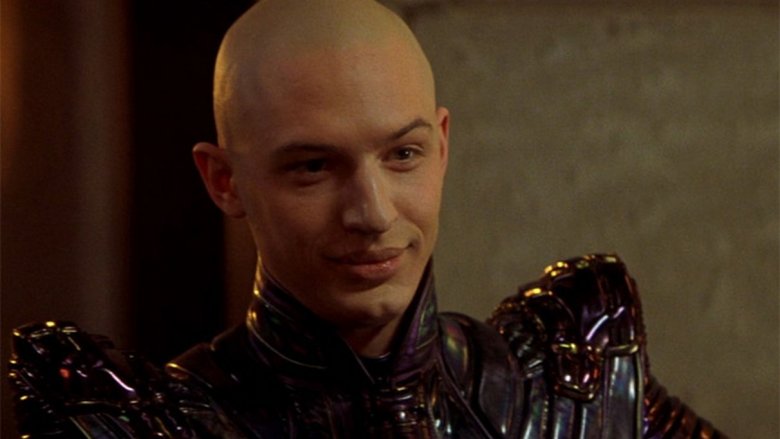Great Acting That Couldn't Save These Bad Movies
Sometimes bad movies find good people.
In some cases, the actor just needs a paycheck. Other times a film goes through so many changes that the promising project the actor signed up for is barely recognizable. Sometimes, what an actor envisions when they read the script has nothing to do anything anyone else involved in the film has in mind. Or sometimes you're Nicolas Cage, and if you so much as walk by a script, you say yes.
Think about it long enough and it becomes clear why there are so many stories of actors who turned down roles that ended up turning out to be huge. Picking the right role probably feels like negotiating a mine field. Unfortunately, when a great actor is cast in a bad movie, they're still in a bad movie, and more often than not the best performance in the world isn't going to change that. As proof, here are examples of great acting that couldn't save bad movies.
Don't blame the squad
Suicide Squad is a perfect example of how the DCEU tends to produce better trailers than movies. Director David Ayer introduced all these weird characters to audiences without making anyone care about them. Jared Leto's shot at the Joker failed to impress and the soundtrack hammered audiences with a nonstop shuffle of pop hits, as if the music was being handled by an indecisive teen who kept hitting the Next button. The end result is a big, expensive mess of a movie that never seems to figure out what it wants to be.
Unfortunately there's some great acting that couldn't save the confusion of Suicide Squad. There's Will Smith, who plays the assassin Deadshot; Margot Robbie, who brought Joker protégé/main squeeze Harley Quinn to colorful life; and Viola Davis, who embodied the dedicated and merciless Amanda Waller. The good news is that with spinoffs and sequels already in the works, we'll likely get to see these actors in the same roles, and hopefully handled with better care. We know for sure Robbie is set to return as Harley Quinn in a number of different projects. Time will tell if the filmmakers have learned from their mistakes.
He had a specific set of skills
How can you take of the most well-known franchises in the world, offer new chapters fans had been waiting on for decades, fill it with the top rung of Hollywood talent, have some of the most insanely impressive effects technology at your command, and still end up with what the Guardian's Philip French called "cinematic junk food"?
In a film defined by mediocrity, Liam Neeson as the Jedi Knight Qui-Gon Jinn stands out. It won't be remembered as one of Neeson's best performances, but unlike co-stars Ewan McGregor and Natalie Portman, Neeson invests fully in his role. What's more, his character is arguably the most interesting of any of those introduced in Phantom Menace. He's just as single-minded and passionate as Luke was in Empire Strikes Back, but he's tempered with the kind of age and experience we saw in Alec Guinness' original portrayal of Obi-Wan Kenobi. The argument could be made that he's the most compelling character in the Star Wars prequels.
So, of course, he had to die.
We named the dog Crystal Skull
In 2008, for the first time in nearly 20 years, director Steven Spielberg wrangled Harrison Ford back into the role of Indiana Jones for the disappointing Indiana Jones and the Kingdom of the Crystal Skull. Instead of nazis or Thugee cultists, this time Indy was facing the KGB at the height of the Cold War. In the end it turned out rather than searching for artifacts from the ancient gods, the otherworldly forces Irina Spalko (Cate Blanchett) was trying to contact were from a different solar system. Even if you forget the absurdity of the aliens, Crystal Skull is a weak reflection of previous installments.
Regardless, you can't lay the blame at the feet at either Ford or Blanchett, both of whom deliver more of the great acting that's defined their careers — even if it isn't enough to save the movie. As David Denby writes in The New Yorker, Blanchett as the arrogant Soviet agent is "the best thing in the picture." And while he may have aged, Ford's advanced years don't stop him from delivering what the Houston Chronicle's Amy Biancolli calls "that same sardonic manliness." But it's not enough to save a sequel lacking in so many other ways.
You should've skipped to 13
If it isn't clear yet that a great film — or even a good one — needs more than great acting, Ocean's Twelve should be the smoking gun. With stars like Brad Pitt, George Clooney, Julia Roberts, Matt Damon, Catherine Zeta-Jones, Andy Garcia, Don Cheadle, Andy Garcia and more, if all you needed for a good movie was great talent, then Ocean's Twelve would be in the running for one of the best films of all time. So why couldn't they save the movie?
The critical consensus seems to agree with the headline for David Ansen's Newsweek review, which argues that the film favors "style over substance." Most critics felt the movie's plot was weak to the point that, as Washington Post's Stephen Hunter wrote, "no one has thought much about story at all." Entertainment Weekly's Lisa Schwarzbaum saw Ocean's Twelve as a vanity project, writing, "All of the fun of Ocean's Twelve takes place off screen, as if behind a VIP-lounge velvet rope."
Thankfully, the cast and crew rallied enough to end on a high note with the trilogy's final installment, 2007's Ocean's Thirteen.
You should've used the spoon
Robin Hood: Prince of Thieves deserves the critical beating it took. First, there was Kevin Costner's wooden portrayal of Robin Hood, a character usually given much more flair and fun. Los Angeles Times' Kenneth Turan called Costner's crack at Robin Hood the "doofiest yet put on film," saying he was, "not bold or charismatic enough to be a convincing outlaw king." Second, there was the film's lack of focus or cohesion. Gene Siskel called it "an entertainment without a particular point of view," while Roger Ebert said it was "murky, unfocused, violent and depressing."
But in a film best left forgotten, there's still some great, hilarious acting from the late Alan Rickman as the villainous Sheriff of Nottingham. He was a bit too funny, really, never seeming much like an honest threat to Robin Hood. But he was at least memorable, funny, and threw himself into the role. It's regrettable that such sincere investment was wasted on an otherwise mediocre film.
They pulled him back in
Few film trilogies have ended as disappointingly as Francis Ford Coppola's epic Godfather series. Set a decade after the events of The Godfather Part II, the third film is missing Robert Duvall (who wisely turned down the opportunity to reprise his role), Winona Ryder as Michael Corleone's daughter (she was replaced with Coppola's daughter Sofia at the 11th hour), and pretty much anything that made the previous two films great.
But it wasn't acting that made The Godfather Part III such a lemon. Andy Garcia's portrayal of Vincent Mancini — Michael Corleone's nephew — was, as Desson Howe wrote in The Washington Post, "the best thing" about the film, and the dynamic between Garcia and Al Pacino leads to "the best scene in the movie" — the climax of killings ending with the death of Corleone's daughter.
Some might argue that the Pacino of Godfather, Part III was playing more Pacino than Corleone. The Michael Corleone of the first two films was a quiet man, with all of his darkness raging inside him, rarely allowing his emotion to show. But in Part III, Corleone is much more at ease with himself, much more of an extrovert. It makes sense that the character would evolve — that he would've eased up, that he would grow more comfortable with himself, is par for the course.
This wolf had fleas
No one would've blamed you for getting excited about 2010's Wolfman. At least, no one would have blamed you in 2009, when all we knew was that it had a killer cast that included Benicio del Toro, Anthony Hopkins, Emily Blunt, and Hugo Weaving.
Unfortunately, in spite of all that talent, Wolfman failed to impress critics or audiences. Critics found it slow, not particularly scary, and quite a few seemed to agree that Wolfman didn't know exactly what kind of movie it wanted to be. James Adams of The Globe and Mail wondered if the film had been infused with "some biting wit or a flash of panache or campy self-awareness," rather than taking itself as seriously as it did, things might have worked out better. Rolling Stone's Peter Travers pointed out what might have very well been the core issue for Wolfman – Mark Romanek, the "dark visionary" responsible for One Hour Photo, dropped out of the production a few weeks before filming. His replacement was Joe Johnston, whose directorial credits up to that point included Honey, I Shrunk the Kids, The Rocketeer, and Jumanji.
Go back to Mars
The fact that he'd just finished Ed Wood — about the director of the '50s campy sci-fi flick Plan 9 from Outer Space — might have had something to with Tim Burton's choice to make this dark, violent, effects-heavy parody of movies like Plan 9. The list of stars is surprisingly long, including Jack Nicholson, Glenn Close, Martin Short, Annette Bening, Danny Devito, Natalie Portman, Jack Black, and more.
In spite of that impressive roster of talent, critics and audiences panned Mars Attacks!, and if anything, its massive cast hurt more than it helped by making sure no single actor got a chance to shine. As the Washington Post's Rita Kempley pointed out, the film spent so little time on the respective stars that it lacked "a clear-cut protagonist." There's plenty of genuine humor in Mars Attacks!, but as ReelViews' James Berardinelli observed, "when Burton finds a gag that works, he overuses it." On the other hand, much of the humor suffers from what Stack called a "mean-spirited mentality," reflected in the fact that much of the comedy revolves around characters being abruptly and horribly murdered.
Please do not make it so
Anytime you're feeling nostalgic for the films of the Star Trek: The Next Generation cast, a quick viewing of Star Trek: Nemesis will cure you.
Tom Hardy played Nemesis villain Shinzon, a clone of Captain Picard (Patrick Stewart) raised by a subspecies of dark-dwelling Romulans. Hardy makes a great villain, and he put in the work, telling Total Film Magazine that he was "terrified" the entire time and hardly did anything but work 17-hour days and sleep.
But while Hardy made for a great villain, he couldn't save the movie because he didn't make the right great villain. Shinzon is a clone of Picard and, as the San Francisco Chronicle's Mick LaSalle pointed out, he "looks nothing like Picard." LaSalle noted that instead, Hardy looked more like Pinhead from Hellraiser, while USA Today's Mike Clark went with Dr. Evil of Austin Powers fame.
Still, it's worth watching Nemesis at least once if you can stand it, if for no other reason to see Hardy looking utterly waifish and knowing that he would go on to play the back-breaking Batman villain Bane in The Dark Knight Rises.
